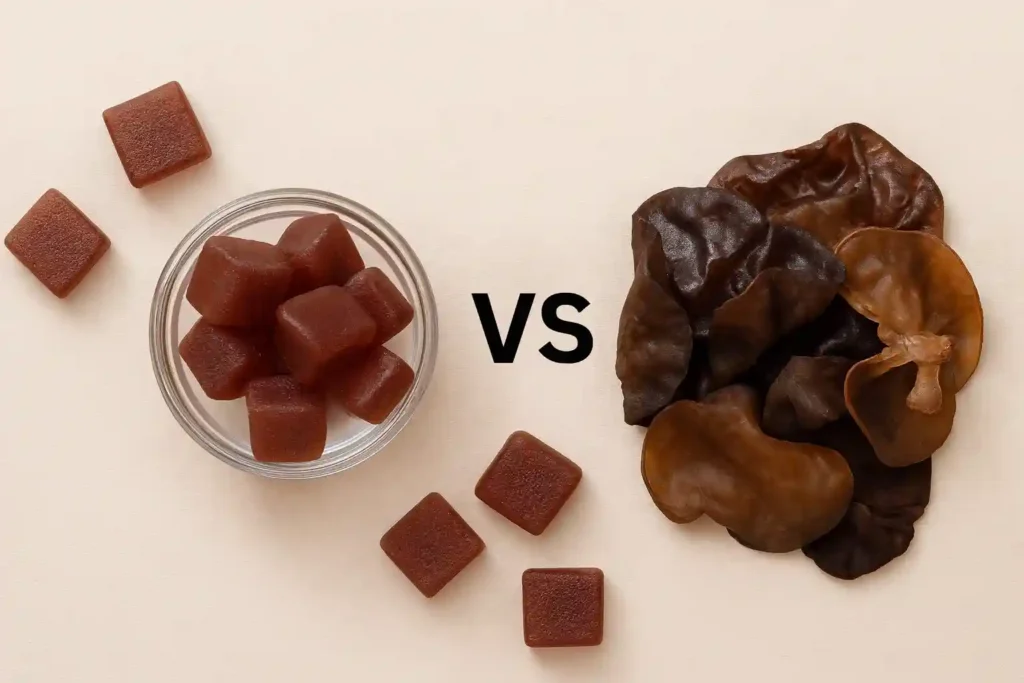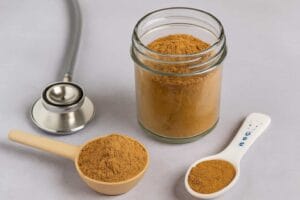When it comes to improving digestive health, many natural remedies have gained popularity, including various types of mushrooms and mushroom-based supplements. Among these, the debate between Mushroom Gummies vs Wood Ear Mushroom for Digestion has caught the attention of wellness enthusiasts and health experts alike. Both offer unique benefits, but which one truly supports gut health more effectively? In this article, we’ll explore the nutritional profiles, digestive benefits, and overall impact of these two options to help you make an informed choice.
If you’re interested in exploring how different mushrooms affect gut health, you might also want to check out our detailed comparison of Mushroom Gummies vs Enoki Mushroom for Gut Health.
Mushroom Gummies vs Wood Ear Mushroom for Digestion: Understanding the Basics
Before diving into the detailed comparison, it’s important to understand what mushroom gummies and wood ear mushrooms are, and how they’re typically used to support digestion. Both offer unique digestive benefits, and exploring Mushroom Gummies vs Wood Ear Mushroom for Digestion helps reveal which option may better suit your wellness goals.
What Are Mushroom Gummies?
Mushroom gummies are dietary supplements that contain extracts from various medicinal mushrooms, often combined with other vitamins and natural ingredients. These gummies are designed for convenience and ease of consumption, making it simple to incorporate mushroom benefits into your daily routine. Common mushrooms used in gummies include reishi, lion’s mane, chaga, and cordyceps, each known for their unique health properties.
What Is Wood Ear Mushroom?
Wood ear mushroom (Auricularia auricula-judae) is an edible fungus native to Asia, renowned for its crunchy texture and subtle flavor. Traditionally used in Asian cuisine and herbal medicine, wood ear mushrooms are praised for their high fiber content and ability to promote digestive health. They are often consumed fresh, dried, or in powdered form.
Digestive Benefits: Comparing Mushroom Gummies and Wood Ear Mushroom
Both mushroom gummies and wood ear mushrooms offer digestive benefits, but they do so through different mechanisms and nutritional profiles. When comparing Mushroom Gummies vs Wood Ear Mushroom for Digestion, it becomes clear that each option supports gut health in unique ways — from fiber-rich properties to bioactive compounds that aid smooth digestion.
Fiber Content and Gut Health
Wood ear mushrooms are particularly rich in dietary fiber, which is essential for maintaining healthy digestion. Fiber helps regulate bowel movements, prevents constipation, and supports the growth of beneficial gut bacteria. This makes wood ear mushrooms a natural choice for those seeking to improve their digestive function through diet.
On the other hand, mushroom gummies may contain some fiber depending on their formulation, but their main digestive benefits often come from bioactive compounds like beta-glucans, polysaccharides, and antioxidants. These compounds can help modulate the immune system in the gut and reduce inflammation, indirectly supporting digestion.
Prebiotic Effects
Both options can act as prebiotics, substances that feed the good bacteria in your gut. Wood ear mushrooms, with their high fiber and polysaccharide content, provide a natural food source for probiotics, enhancing gut microbial diversity.
Mushroom gummies, depending on their mushroom blend, may also contain prebiotic compounds. Some gummies use extracts from mushrooms known for their gut-healing properties, which can aid in balancing the gut microbiome.
Convenience and Dosage Control
One of the main advantages of mushroom gummies is convenience. They offer a standardized dose of mushroom extracts, making it easier to track intake and ensure consistent benefits. This is especially useful for people with busy lifestyles or those who dislike the texture or taste of whole mushrooms.
Wood ear mushrooms, while nutritious, require preparation and cooking. Their fiber content is naturally high, but the exact dosage and bioactive compound intake can vary depending on how they are prepared and consumed.
Nutritional Comparison Table: Mushroom Gummies vs Wood Ear Mushroom
| Nutrient/Benefit | Mushroom Gummies | Wood Ear Mushroom |
|---|---|---|
| Dietary Fiber | Low to Moderate (varies by product) | High (rich in soluble and insoluble fiber) |
| Beta-Glucans & Polysaccharides | High (concentrated extracts) | Moderate (natural form) |
| Antioxidants | Moderate to High (depends on mushroom blend) | Moderate |
| Prebiotic Potential | Moderate | High |
| Convenience | Very High (ready-to-eat) | Low (requires cooking/preparation) |
| Digestive Support | Immune modulation and gut health support | Improves bowel regularity and gut flora |
Which One Should You Choose for Better Digestion?
Deciding between mushroom gummies and wood ear mushroom for digestion depends on your personal preferences, lifestyle, and health goals. When comparing Mushroom Gummies vs Wood Ear Mushroom for Digestion, both options provide unique digestive support — gummies offer convenience and consistency in dosing, while wood ear mushrooms naturally enhance gut microbiome balance through their rich fiber content and antioxidant compounds.
- If you prioritize convenience and consistent dosing: Mushroom gummies are an excellent choice. They provide concentrated mushroom extracts that support digestion through immune modulation and antioxidant effects.
- If you prefer natural whole foods and higher fiber intake: Wood ear mushroom is a fantastic option. Its high fiber content promotes bowel health and nourishes your gut microbiome naturally.
- Combining both: Some people find that incorporating both mushroom gummies and wood ear mushrooms into their routine offers complementary benefits, enhancing overall digestive wellness.
For a broader understanding of mushroom supplements and their nutritional impact, you might find our article on Mushroom Gummies vs Porcini Mushroom for Nutritional Value very insightful.
Potential Side Effects and Considerations
While both mushroom gummies and wood ear mushrooms are generally safe, it’s important to consider possible side effects and interactions.
- Allergies: Some individuals may be allergic to certain mushroom species or ingredients in gummies.
- Digestive Sensitivity: High fiber intake from wood ear mushrooms might cause bloating or gas in sensitive individuals.
- Medication Interactions: Certain mushroom extracts can interact with blood thinners or immunosuppressants, so consult your healthcare provider if you’re on medication.
F.A.Q
What are the main differences between mushroom gummies and wood ear mushroom for digestion?
Both support digestion but in different ways. Mushroom gummies provide concentrated extracts that help modulate gut immunity and reduce inflammation, while wood ear mushrooms offer high fiber content that promotes bowel regularity and feeds beneficial gut bacteria.
Can mushroom gummies replace whole mushrooms like wood ear for gut health?
Mushroom gummies can be a convenient supplement but may not fully replace the benefits of whole mushrooms like wood ear, especially when it comes to dietary fiber. Combining both can offer a more comprehensive approach to digestive wellness.
How often should I take mushroom gummies to support digestion?
Dosage varies by product, but typically, taking mushroom gummies daily as per the manufacturer’s instructions is recommended for digestive support. Always consult with a healthcare professional for personalized advice.
In the debate of Mushroom Gummies vs Wood Ear Mushroom for Digestion, which is better for long-term gut health?
Both have their merits: wood ear mushroom offers sustained fiber benefits essential for long-term gut health, while mushroom gummies provide targeted immune and antioxidant support. Incorporating both into your routine can maximize digestive benefits. For more on mushroom supplements and heart health, consider our article on Mushroom Gummies vs Oyster Mushroom for Heart Health.
5. What does the study on psychoactive mushroom gummies in Oregon reveal
A 2025 study published in Clinical Toxicology (Phila) analyzed recreational psychoactive mushroom gummies sold in Portland, Oregon. Following Oregon’s legalization measures in 2020, researchers conducted a quantitative analysis to assess psilocybin levels and product consistency. The findings revealed significant variability in the potency and composition of these gummies, highlighting the need for stricter quality control and standardized labeling for consumer safety. You can read the full PubMed article Quantitative analysis of recreational psychoactive mushroom gummies in Portland, Oregon



